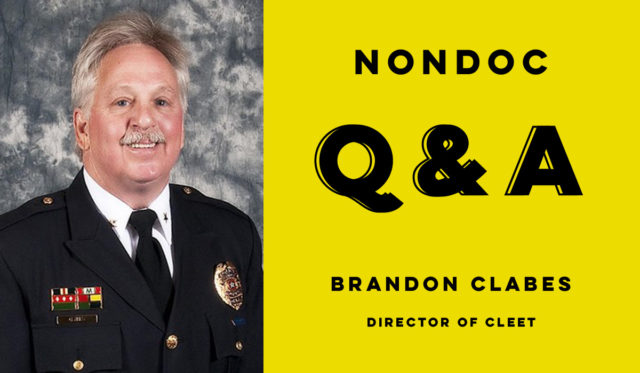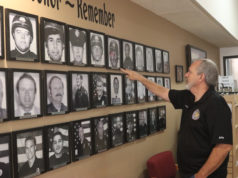

Brandon Clabes served as Midwest City’s police chief for more than 20 years. Now, after retiring from the department earlier this year, he is taking on a new role as executive director of the state’s Council on Law Enforcement Education and Training, better known as CLEET.
Established in 1963, the state agency is responsible for a variety training certifications for law enforcement officers around the state. Clabes recently spoke with NonDoc about his new job, his old one and what has stuck out to him most during his long career in law enforcement.
The following conversations has been edited lightly for style and clarity.
You recently retired from the Midwest City Police Department after a long and successful tenure as chief. What was it that made you want to continue your career with CLEET?
I felt like I had left everything on the playing field for the City of Midwest City, but I knew God had given me a purpose to make a change in a different venue. The CLEET director position came open late last year, and it was a tremendous opportunity both personally and professionally.
In Midwest City, the police department is one of the finest across the United States. The personnel had embraced the concept of community-based policing, we established multiple outreach programs with the help of our community, and critical programs internally had been established: a police community advisory board, a mental health and substance abuse clinician to assist incarcerated individuals getting their lives back on track, and realistic up-to-date 21st century policing policies. All this combined led to a mutual level of respect for everyone involved. I’m very pleased with the accomplishments and look ahead to do the same at a state level.
You have been a member of a police department for decades. What has the transition been like for you?
I have actually experienced six decades in law enforcement. When I started, you had minimal training and went to work immediately. I literally patrolled the streets for almost a year before I was certified by CLEET in 1980. As a police officer, your expectations were simple — enforce the law. Now it is so diverse, and police officers today are much better equipped in dealing with society’s ill will. I spent 27 years of my 42 in upper management. The streets changed drastically over time, as did violent crime. I don’t think I would want to be a young police officer in these times given how some of the public vilifies our profession.
What was the part of your old job you enjoyed most, and is there one memory that stands out?
The best part of my job was being a first-line supervisor. In that position, you were able to mold young officers into servants of the public. It was gratifying to see them grow in the area of law enforcement, very similar to raising a child into a productive adult. I was a person who tried to instill respect, value and caring while delivering professional police services — leading by example was important.
One of my most rewarding memories was the Austin Bell case. It was in the early 90’s, and he was kidnapped from Midwest City by a woman out of Pennsylvania. It was all orchestrated by the computer, which then was new technology. We worked in unison with the local FBI office and recovered him unharmed along the east coast. It was a national news story with a happy ending. The investigators on the case were recognized by the Department of Justice and honored at the White House.
Can you talk a little bit about CLEET’s mission?
CLEET is the best kept secret in Oklahoma. It is a small state agency that has a huge impact on Oklahoma as a whole regarding law enforcement. This is what attracted me to the job. I can make a positive and meaningful change on how we deliver training to new police officers.
CLEET has dedicated employees that understand the unbelievable task at hand in preparing the future of law enforcement. CLEET is responsible for basic police officer certification, peace officer records and regulations, private security and bail enforcer regulation, private security training, polygraph examiners, reserve police officers, K-9’s, drug dogs, new law enforcement agencies, new jail trust (employees), self-defense act instructor regulations and a multitude of other responsibilities as cited under state statute. We are understaffed and need appropriations, and my role as director is to work with legislators for funding. Sen. Roger Thompson (R-Okemah) and Rep. Kevin Wallace (R-Wellston) have been very receptive to our needs, and we are grateful for their support.
What is CLEET’s role in training police officers, and what’s the one thing you would like the public to know about it?
CLEET is responsible for providing basic police officer certification training and regulating academy cities, metro techs who teach basic police officer certification, higher education COP programs, and all of the regulatory requirements that come with statutory mandates.
The public needs to know that CLEET is vital for the safety of our communities by producing well-trained local, county and state police officers. What CLEET provides may be the only training some officers receive in their career other than continuing education. There is tremendous pressure to get it right the first time, and every citizen should be assured that CLEET employees understand that and strive everyday to be successful.
The national conversation about use-of-force and implicit bias in policing is an important one. What can you say about how CLEET currently trains officers on these topics, and what do you believe can be done better moving forward?
When I was chief at Midwest City, relationships with the community and understanding their expectations of law enforcement was critical for our success. We had a very strict use-of-force policy that required detailed reporting. We trained consistently throughout the year on the use-of-force model in conjunction with firearms. In my transition to CLEET director, pillars of policing in the 21st century are important to me for the next generation of law enforcement, especially in the area of implicit bias. Critical incidents will occur, and our agency is responsible for preparing these men and women to make the right decision under stressful conditions. We also have to look at what implicit bias means, and simply put, everyone has them. However, under the color of law, an officer must understand what those personally look like to him/her and not allow them to interfere while delivering services regardless of race, creed, religion, etc.
We can always do better from a training aspect, and it’s imperative we encourage our new officers to study, learn, discuss, and practice the educational foundation provided to them, including the latest study by the Department of Justice on policing in America. Additionally, training doesn’t stop the day recruits graduate and are certified by CLEET. The expectation from the public, and rightfully so, is that every officer complete continuing education above and beyond what is required by the state. Law enforcement is a diverse occupation, the key being education and training.
How has training changed since you were a recruit new to policing?
Training is diverse. Technology is paramount in law enforcement along with the needs society demands. We have to be counselors, mental health specialists, understand implicit bias, how to de-escalate and know what trauma-informed policing encompasses.
In addition, new officers have to have a basic foundation in information technology because everything is done on computers and paperless. In the old days, you had a six-shot revolver, night stick and maybe a hand-held (radio). Now, the modern day police officer has so many more tools to accomplish the mission.




















